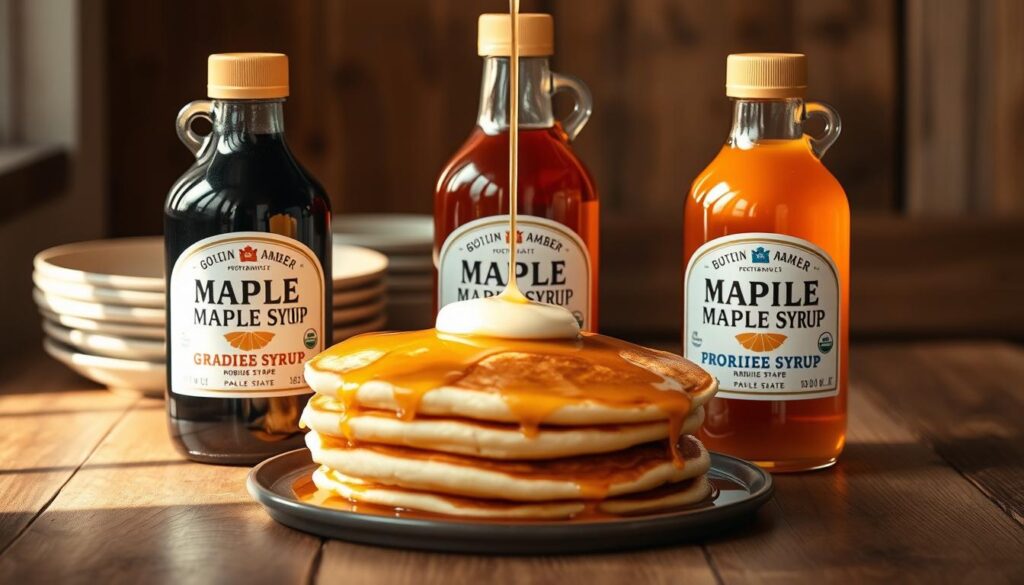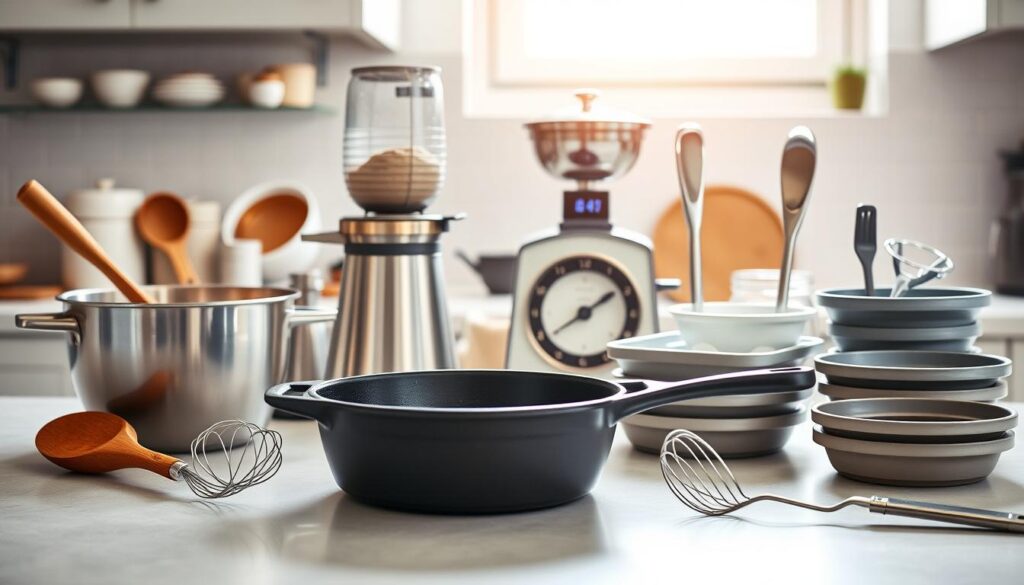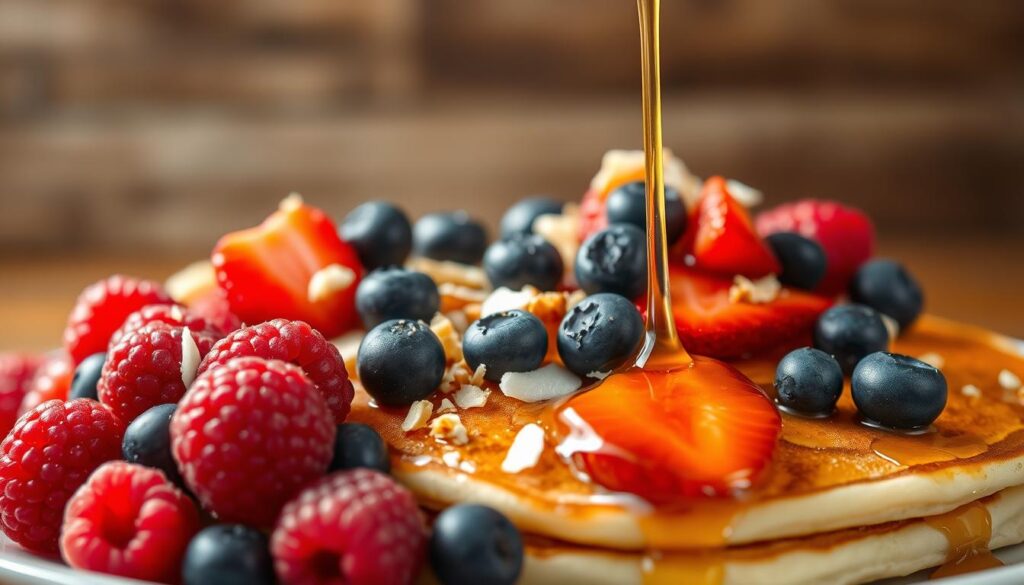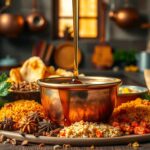Imagine waking up to the golden aroma of buttermilk pancakes with maple syrup. This classic combo turns a simple morning into a feast of flavors and tradition. Pancakes with maple syrup are more than a meal; they’re a beloved American breakfast that brings families together.
The magic happens when maple syrup meets buttermilk pancakes. The sweet maple notes and tangy buttermilk create a taste experience that excites your senses. Each bite tells a story of American culinary history, tracing back to New England’s maple forests.
Sugarmakers in Vermont and New Hampshire have mastered making maple syrup. They tap sugar maple trees during the winter-to-spring transition. Their hard work ensures your breakfast captures the real, deep flavors that industrial syrups can’t match.
Whether you’re a home cook or a breakfast lover, learning to make pancakes with maple syrup is a journey. This guide will show you how to make a maple-infused breakfast masterpiece. You’ll learn about choosing the best ingredients and cooking techniques.
The Perfect Marriage: Maple Syrup in Buttermilk Pancakes
Maple syrup and buttermilk pancakes are a match made in heaven. This classic mix brings together flavors and textures that make breakfast special. It turns a simple meal into a memorable experience.
Understanding the Classic Combination
Buttermilk pancakes are the ideal base for maple syrup. The tanginess of buttermilk pairs well with maple syrup’s sweetness. This combination makes pancakes that are both tasty and satisfying.
- Buttermilk provides a light, airy texture
- Maple syrup adds natural sweetness
- Together, they create a balanced flavor profile
Historical Significance of This Pairing
Native American tribes first made maple syrup from tapped maple trees. This tradition has lasted for centuries. Early settlers adopted these methods, adding maple syrup to breakfast dishes like pancakes.
“Maple syrup is more than a condiment – it’s a cultural connection to our agricultural roots.” – Traditional Sugarmaker
Why These Flavors Work Together
The science behind maple syrup and buttermilk pancakes is fascinating. Buttermilk’s acidity makes pancakes tender and fluffy. Maple syrup’s sugars add depth and richness.
Chefs say this mix is a perfect blend of sweetness, texture, and American breakfast tradition.
Essential Ingredients for Fluffy Buttermilk Pancakes
Making fluffy buttermilk pancakes is an art. It needs the right mix of ingredients for a light, airy texture. These pancakes are more than breakfast – they’re a special treat that turns simple ingredients into a delightful brunch.
Let’s look at what makes these pancakes so fluffy:
- Buttermilk: The star ingredient that adds tanginess and tenderness
- All-purpose flour for structure
- Baking powder and baking soda for leavening
- Fresh eggs to bind ingredients
- Unsalted butter for rich flavor
- Pinch of salt to enhance overall taste
The secret to fluffy pancakes is how these ingredients work together. Buttermilk’s acidity mixes with baking soda, creating bubbles that make pancakes light.
“Great pancakes are about precision and passion in equal measure.” – Chef Martha Reynolds
For tasty brunch ideas, here are some pro tips:
- Use room temperature ingredients
- Avoid overmixing the batter
- Let the batter rest for 5-10 minutes before cooking
Whether you’re new to cooking or experienced, these ingredients and tips will help you make perfect fluffy buttermilk pancakes every time.
The Science Behind Buttermilk’s Magic in Pancakes
Delicious pancakes are more than just a simple breakfast recipe. The secret to creating fluffy buttermilk pancakes lies in understanding the science behind them. This science transforms basic ingredients into a culinary masterpiece.
Buttermilk adds a unique chemistry to breakfast recipes. It turns ordinary pancake batter into something extraordinary. The acidic nature of buttermilk is key in making pancakes light and airy.
Chemical Reactions During Cooking
When buttermilk meets baking soda, a fascinating chemical reaction happens. The acid in buttermilk activates the baking soda. This creates carbon dioxide bubbles that make pancakes rise and become tender.
- Acid triggers rapid gas production
- Carbon dioxide creates light texture
- Proteins begin to denature and set
Texture Development Process
The protein structures in buttermilk interact with flour. Gluten development becomes controlled. This prevents tough pancakes and ensures a delicate, soft result.
Temperature Control Techniques
Precise heat management is critical for perfect pancakes. The ideal cooking temperature ranges between 375-425°F. This allows for even browning and complete internal cooking.
- Low heat: Soggy pancakes
- High heat: Burnt exterior
- Moderate heat: Golden-brown perfection
Choosing the Right Maple Syrup Grade

Choosing the right maple syrup can make your pancakes truly special. It’s all about the flavor. The syrup adds a unique taste that makes your breakfast stand out.
Maple syrup grades are based on color and taste. The USDA has four main grades:
- Golden Color, Delicate Taste: Lightest grade, perfect for those who enjoy subtle sweetness
- Amber Color, Rich Taste: Classic pancakes with maple syrup favorite, balanced flavor
- Dark Color, Robust Taste: Intense maple flavor for serious enthusiasts
- Very Dark Color, Strong Taste: Maximum maple intensity
When making homemade syrup, think about what you like. Lighter syrups are great for delicate foods. Darker syrups have a stronger maple taste.
“The right maple syrup can turn simple buttermilk pancakes into a gourmet breakfast experience.” – Maple Syrup Artisans Association
Experts say to match syrup grade with pancake type. For fluffy buttermilk pancakes, Amber Color, Rich Taste is the best choice. It creates a perfect balance of flavors.
Mastering the Perfect Pancake Batter Consistency
Creating delicious pancakes starts with understanding the art of batter preparation. Fluffy buttermilk pancakes need careful technique and precise mixing. This is to achieve that light, airy texture breakfast recipes dream of.
The secret to perfect pancake batter lies in understanding its delicate chemistry. Overmixing can destroy the fluffy texture, while undermixing leads to uneven cooking.
Mixing Techniques for Ultimate Fluffiness
- Use a gentle folding motion when combining ingredients
- Stop mixing when small lumps remain in the batter
- Let the batter rest for 5-10 minutes before cooking
- Use room temperature ingredients for better integration
Common Batter Mistakes to Avoid
| Mistake | Consequence | Solution |
|---|---|---|
| Overmixing | Tough, dense pancakes | Mix until ingredients are just combined |
| Cold ingredients | Uneven cooking | Bring ingredients to room temperature |
| Wrong liquid ratio | Too thick or thin batter | Adjust buttermilk gradually |
Mastering batter consistency transforms ordinary breakfast recipes into extraordinary culinary experiences. Practice and patience are key to creating the most delicious pancakes. These will impress family and friends.
Essential Kitchen Tools for Pancake Success

Starting with the right tools is key to making perfect pancakes with maple syrup. Whether you’re making breakfast or brunch, the right equipment makes a big difference. It can turn your cooking into a fun adventure.
Both professional chefs and home cooks know that quality tools are essential for tasty pancakes. Here are the must-haves for a great breakfast:
- Griddle or Non-Stick Pan: A flat, even-heating surface is key for golden pancakes
- Mixing Bowls: You’ll need sturdy, different-sized bowls for mixing batter
- Whisks and Spatulas: These are vital for mixing batter smoothly and flipping pancakes right
When picking your pancake tools, think about these important things:
- How well they distribute heat
- How durable they are
- How easy they are to clean
- How comfortable and easy to hold they are
Choosing top-notch kitchen tools means you’ll always have delicious pancakes. They’ll impress everyone at your next breakfast or brunch.
Step-by-Step Cooking Techniques for Golden-Brown Results
Making delicious pancakes needs precision and skill. Recipes for morning pancakes require careful cooking techniques. These techniques turn simple batter into golden-brown perfection.
Temperature Management Tips
Learning to cook pancakes starts with heat control. A well-seasoned cast-iron skillet or non-stick griddle is best. Preheat your cooking surface to medium-low heat—around 375°F is ideal.
- Use a light butter coating or cooking spray
- Check surface temperature with water droplet test
- Adjust heat to prevent burning
Flipping Techniques for Perfect Pancakes
Flipping pancakes is an art that turns breakfast recipes into culinary masterpieces. Watch for specific visual cues that indicate the perfect moment to flip:
- Wait until bubbles form across the pancake surface
- Edges should look slightly dry
- Use a thin, wide spatula for smooth flipping
- Flip quickly and confidently in one smooth motion
Pro tip for delicious pancakes: Cook each side for approximately 2-3 minutes until achieving a beautiful golden-brown color. Practice makes perfect!
Creative Toppings Beyond Traditional Maple Syrup

There’s more to pancakes with maple syrup than just the syrup. You can turn them into amazing dishes with creative toppings. These toppings add excitement and make your taste buds happy.
Trying new toppings can open up a world of flavors. The right topping can make simple pancakes into a special meal.
- Fresh Fruit Compotes: Blend seasonal berries or stone fruits for vibrant, natural sweetness
- Nutty Crunch: Sprinkle toasted almonds, pecans, or walnuts for textural contrast
- Gourmet Cream Variations: Whip mascarpone or flavored cream cheese for luxurious spreads
| Topping Category | Flavor Profile | Best Pancake Pairing |
|---|---|---|
| Fruit Compotes | Tangy and Sweet | Classic Buttermilk Pancakes |
| Nut Crumbles | Crunchy and Rich | Whole Grain Pancakes |
| Cream Spreads | Smooth and Decadent | Light Vanilla Pancakes |
Don’t forget about savory toppings. Try crumbled bacon, herb-infused goat cheese, or caramelized onions. They’re great for those who like a little adventure in their breakfast.
Experiment fearlessly – the perfect pancake topping is a personal culinary journey.
Making Homemade Flavored Maple Syrups
Making your own syrup turns breakfast into a gourmet treat. Maple Syrup in Buttermilk Pancakes gets even better with custom syrups. These syrups make your morning meal special.
Creating flavored maple syrups is fun and easy. It lets you try out new flavors that go great with buttermilk pancakes.
Infusion Methods and Combinations
Try these cool ways to make your syrup:
- Cold Infusion Method: Soak fresh herbs or spices in maple syrup for 24-48 hours
- Heat Infusion Technique: Warm maple syrup with flavor ingredients to get strong tastes
- Fruit-Inspired Combinations: Mix maple syrup with fresh berries, citrus zest, or vanilla beans
Storage and Preservation Tips
Keep your syrups fresh and safe to eat:
- Store in sterilized glass containers with tight lids
- Keep them in the fridge to stay fresh
- Use them within 2-4 weeks for the best taste
Try making syrups like lavender-infused or cinnamon-spiced. Your homemade syrup will make buttermilk pancakes a truly special dish.
Nutritional Benefits of Real Maple Syrup
Maple syrup in buttermilk pancakes is more than just sweet. It’s packed with nutrients that go beyond sugar.
Real maple syrup is different from other sweeteners. It has antioxidants and offers health benefits when used in small amounts.
- Contains 24 different antioxidants
- Rich in minerals like zinc and manganese
- Provides trace amounts of calcium and potassium
- Lower glycemic index compared to refined sugar
Pure maple syrup is a better choice for those who care about their health. One tablespoon has about 52 calories and many beneficial compounds.
| Nutrient | Amount per Tablespoon |
|---|---|
| Zinc | 0.8 mg |
| Manganese | 0.7 mg |
| Calcium | 20 mg |
| Potassium | 40 mg |
Maple syrup is a natural sweetener with nutrients. It’s better than other sugars. Using it with protein-rich pancakes makes a great breakfast.
Moderation is key: Enjoy maple syrup as part of a balanced diet.
Serving and Presentation Ideas for Brunch
Creating memorable brunch ideas is more than just cooking tasty pancakes. The way you present them can make a big difference. It turns sweet breakfast treats into a feast for the eyes and taste buds.
At a brunch, how you present your buttermilk pancakes is key. The right plating can turn a simple breakfast into a gourmet meal.
Elegant Plating Techniques
- Stack pancakes at varying heights for architectural interest
- Use white porcelain plates to create color contrast
- Garnish with fresh berries and mint leaves
- Drizzle maple syrup in artistic zigzag patterns
Temperature Maintenance Strategies
Keeping pancakes warm is important. It’s all about the texture. Professional chefs have tips to keep them warm.
- Preheat oven to 200°F and place pancakes on a wire rack
- Cover with a clean kitchen towel to prevent moisture buildup
- Use a warming tray for buffet-style serving
- Serve pancakes immediately after cooking for optimal temperature
By using these presentation and temperature tips, your buttermilk pancakes will be the star of the brunch. They’ll impress your guests and meet their culinary dreams.
Troubleshooting Common Pancake Problems
Making delicious pancakes can be tricky, even for experienced cooks. To make fluffy buttermilk pancakes, you need to know how to solve common problems. These issues can ruin your breakfast recipes.
The main problems with pancakes come from three areas: batter, cooking, and ingredients.
- Dense, heavy pancakes often result from overmixing the batter
- Thin, rubbery pancakes indicate too much liquid
- Uneven cooking suggests inconsistent pan temperature
“Perfect pancakes are about precision and patience” – Breakfast Culinary Experts
Now, let’s look at solutions for common pancake problems:
| Problem | Cause | Solution |
|---|---|---|
| Lumpy Batter | Improper mixing | Gently fold ingredients, leave small lumps |
| Pale Pancakes | Low cooking temperature | Use medium-high heat, preheat griddle |
| Tough Texture | Excessive gluten development | Mix ingredients minimally |
By using these troubleshooting tips, home cooks can make fluffy buttermilk pancakes. These pancakes will impress your family and friends.
Conclusion
Making the perfect morning pancakes is more than a skill—it’s an art. It connects us to our favorite breakfast traditions. The mix of buttermilk pancakes and pure maple syrup makes a special treat for breakfast.
Whether you’re new to cooking or have lots of experience, this guide helps you make top-notch Maple Syrup in Buttermilk Pancakes. You’ll learn about batter consistency and the best maple syrup grade. Each step makes your breakfast a treat for the senses and the heart.
These pancakes are about more than food—they’re about joy, sharing, and connection. Start the process, try new flavors, and let your creativity flow. Each pancake, golden and syrupy, invites you to enjoy a homemade breakfast slowly and with joy.
Learning to make buttermilk pancakes is a journey with endless possibilities. Your kitchen is a place to express yourself and explore flavors. With these techniques, you can create breakfast memories that will last a lifetime.



